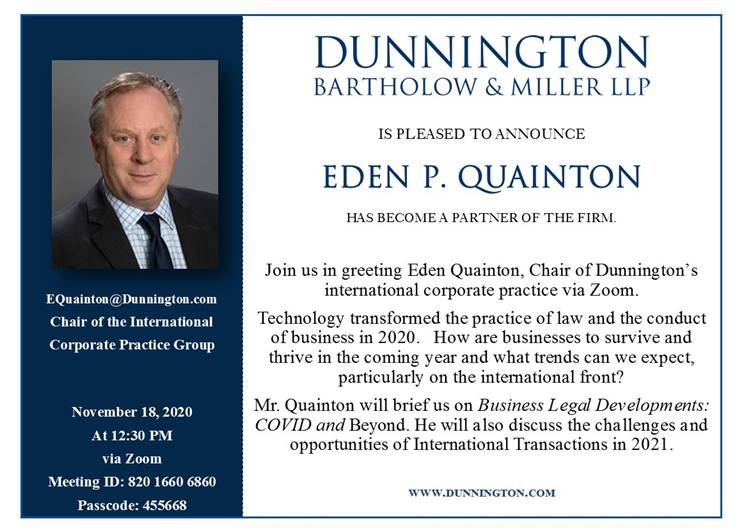Dunnington’s Kamanta Kettle shares her thoughts on the importance of diversity in corporate governance in the April edition of The Mother Court, a quarterly newsletter published by the SDNY Chapter of the Federal Bar Association. The newsletter can be found here.
Dunnington partner Rudyard Ceres is a key speaker at the Success Talks Series: Accelerate Your Career 2021 Conference, which takes place on June 15 and June 16. Each day of this two-day conference will include a variety of speakers who discuss the meritocracy tale, the art of being indispensable, strategies to manage employees, and ways to succeed in a hybrid environment. Read More
The FCPA has become a major source of liability for US and foreign firms with total fines and penalties exceeding $6.4 billion in 2020. Join Dunnington partners Eden Quainton and Luke McGrath and their multinational legal team on March 30, 2021 at 12:30 pm EDT for a webinar on FCPA risks and strategies for small and medium-sized enterprises.
Please register here.
Join partner Eden Quainton and Luke McGrath and their multinational team of international lawyers from France, Italy, and Latin America on March 10, 2021 at 8:00 am EST for a discussion on how individuals and small companies can implement programs to avoid or reduce liability under the Foreign Corrupt Practices Act.
Please register here.
2020 smashed all FCPA enforcement records, with total fines and penalties exceeding $6.4 billion. Join Dunnington partners Eden Quainton and Luke McGrath and their multinational team of lawyers from France, Italy and Latin America on January 21, 2021 at 12:00 pm EST as they walk through FCPA risks and strategies for small and mid-size businesses. Read More
Please join Gruppo Italiano and Dunnington, Bartholow & Miller LLP Partners William Dahill and Nicola Tegoni on Monday, January 18th at 3:00pm EST for Rebuilding Our Community: PPP Round Two, Work Culture, and Immigration Update… an informative Italian Table Talks Webinar hosted by Gianfranco Sorrentino. Read More

Mr. Quainton is a member of Dunnington’s corporate, international, France and Latin America Desks, litigation/ADR and employment practice areas. Mr. Quainton’s practice focuses on corporate transactions and civil litigation. He speaks French, Spanish, Russian and Italian, and has a working knowledge of German. Read More
In October, the Appellate Division, Second Department unanimously sustained a precedent setting decision obtained by Partner Robert N. Swetnick holding two members of a limited liability company had the right to expel the third member, and that such expulsion did not trigger dissolution of the company. Furthermore, the expelled member did not have the right to receive his pro rata interest in the real estate portfolio of the company, but instead the remaining members could elect to simply purchase his interest.
One of the most important issues entrepreneurs and business owners have to address when forming an entity for their business is fundraising. An entrepreneur that will be raising capital has to make the choice of entity that she believes will be most conducive to that objective. Two entities that are often chosen as the entity for new businesses are limited liability companies (LLCs) and C-Corporations. When it comes to fundraising, there are a variety of factors and questions an entrepreneur must address in deciding which of those entities to choose for the business. We address two of those issues here: (a) the source of the capital and (b) long term goals & exit strategy. Read More
When setting up a company, you must not only choose the right type of entity, but the right state of formation. The term “incorporate” means you are forming a corporation, but a corporation may not necessarily be the best choice for your business (we will address this issue in next week’s post). You may also have heard that Delaware is the premium jurisdiction for your startup. That may be the best choice in some instances, but not always. There are a number of factors to consider when setting up your company, such as how business-friendly the state is, or whether the state is widely recognized as a hub for your venture’s specific industry. Other considerations include proximity to your business, legal jurisprudence favorable to you, and of course, tax implications. Read More

